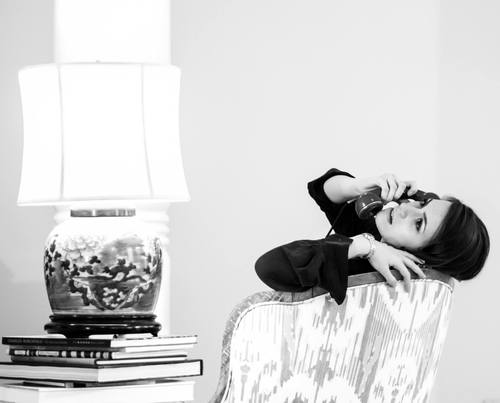Young soprano shines in intimate Poulenc monodrama

Jacquelyn Stucker performs Poulenc’s “La Voix Humaine” Wednesday night at Bas Fisher Invitational in Miami. Photo: Carol Julien
Although Francis Poulenc first achieved fame as a member of “Les Six,” the group of French composers who fused populist and music hall elements with classicism, his finest work may be his liturgical and operatic scores. Poulenc’s opera The Dialogues of the Carmelites is an emotionally shattering twentieth-century classic. He followed this large-scale work with La Voix Humaine, a monodrama based on a play by Jean Cocteau. The opera is the story of a final phone conversation between a woman and her former lover who has left her for another woman.
On Wednesday night Bas Fisher Invitational, a downtown Miami gallery, was transformed into the most intimate of music theater spaces for a gripping production of Poulenc’s drama, staged by the New York production company Amanda and James (and coproduced by Culturadora, a Miami-based producer of exhibitions). Rachel Libeskind provided the striking art installation and set, combining exhibition with contemporary opera design.
Director James Danner has staged an up-close and personal version of Poulenc’s solo tour de force. With only a limited number of seats, the audience is literally in the room with the protagonist Elle. Danner has envisioned Elle as an artist who lives in her studio. She awakens and begins to leave but the phone rings with the voice of her lover on the line. Over the next forty-five minutes, she moves from her bed to her work desk and lounge chair as she recalls better times and pleads with him to return to her.
There are constant interruptions and disconnections on the line. At one point when attempting to call him back, she discovers he is not at home and is calling from elsewhere (in the era before cell phones). When Elle later hears music in the background during their conversation, her jealousy flairs as she accuses him of being at the residence of his new flame. She finally tells him she sleeps with the phone and has placed the cord around her neck, collapsing in an apparent suicide. Poulenc sets the heroine’s emotional disintegration in speech-like recitative, breaking into brief episodes of lyricism.
Musically and dramatically Poulenc’s solo vehicle demands a soprano of immense gifts and theatrical charisma. Jacquelyn Stucker, a doctoral candidate at the New England Conservatory of Music and graduate of the Bard College vocal program, gave a stunning performance. Displaying a dark-tinged soprano with a dusky lower register, Stucker gave notice she is a singing actress to be reckoned with.
Alternately pleading and cajoling in lovely tones, she brought power and strength at the top range as Elle turned agitated and angry. Stucker paid careful attention to Cocteau’s text, riding Elle’s emotional roller coaster from hopeful reverie to heartbreak and despair. Her voice was devoid of stridency at upper and lower extremes and she assayed the text with finely nuanced dynamics, the line “I can’t breathe” almost rendered in a whisper.
Poulenc’s music often belies the text and Stucker could float a meltingly beautiful song-like stroph even as Elle calmly recalled taking a large dose of sleeping pills in an attempt to end her life. Her final desperate cry of “I love you” before collapsing was intense and tragically potent. Stucker is a potentially major talent. (She will be the cover for Isabel Leonard in the role of Ada at the Santa Fe Opera premiere of Jennifer Higdon’s Cold Mountain this summer.)
Poulenc’s score was surprisingly effective with only piano accompaniment. Playing a work originally conceived for chamber orchestra, Matthew Odell (a member of the Juilliard faculty) brought superb feeling for the color and shadow of the score’s shifting moods and play of light and darkness and, played with great power in the heroine’s moments of anger. The gallery’s acoustics were resonant, clear and devoid of echo. Brief traffic noise from the street did not break the dramatic spell.
Libeskind’s effective studio set combines paper, photos and sculpture with a mix of imagery from Vermeer, Life magazine and 1950’s catalogues, a modernist reboot of artistic nostalgia, enhancing the atmosphere of this unique production.
La Voix Humaine will be repeated 8 p.m. Friday and Saturday at Bas Fisher Invitational, 100 NE 11th Street in Miami. lvhmiami.com.
Posted in Performances
Leave a Comment
Thu Feb 19, 2015
at 12:05 pm
No Comments




